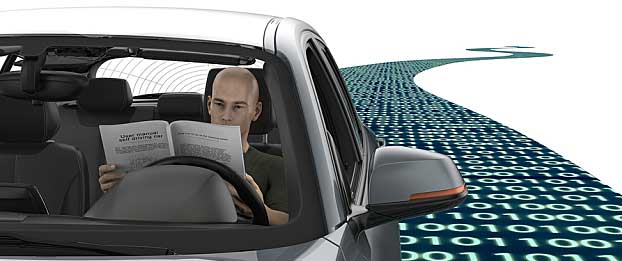Self-Driving Cars: How Soon, Who's Affected and What's the HR Impact?

Self-driving cars represent a massive market opportunity. As noted by The Motley Fool, the driverless car segment could reach $77 billion in less than 20 years. In the near term, The Guardian reports that online retail giant Amazon has just received a patent on networks to handle the challenge of autonomous cars in reversible lanes, which pose a major problem for supposedly intelligent vehicles.
But with so much hope — and hype — around the industry it's often hard to separate fact from fiction. When do experts think these vehicles will be ready for everyday driving? Which industries will see the biggest change? And what does the adoption of self-driving cars really mean for employees who make their living behind the wheel?
The Future, Today?
When will self-driving vehicles transition from good idea to generally available? Depends on who you ask. According to Business Insider, there will be 10 million autonomous cars on the road by 2020, and as noted by Forbes, this may not be so far-fetched. Industry leader Tesla has doubled down on their self-driving tech and promises a level-3 autonomous driving experience — which still requires a driver but allows all critical safety functions to be handled by the vehicle.
Other sources are less optimistic. Scientific American puts the current generation of self-driving cars on a level playing field with teenage drivers — lots of intellectual knowledge and potential skill but little experience behind the wheel. There's also the problem of defining "safe." Do driverless cars need to be perfect at avoiding accidents or just better than human beings? Who's at fault if pedestrians or passengers are injured?
While it's impossible to put a hard-and-fast date on the commercial viability of self-driving vehicles, think sooner rather than later as a general rule.
Who's Affected?
So which industries will see the most significant impact from the uptick in self-driving cars? The most obvious are logistics and transport — think long-haul trucking services, agriculture or hot-shot services. In addition, businesses that rely on drivers to ferry specific items around urban areas, such as hospital lab services or local delivery vehicles, will also experience significant market change. Next up? Ride-hailing services. Uber already tried this in San Francisco but agreed to put the program on hold pending a lack of testing permits. As noted by Motley Fool, up-and-coming organizations like Waymo are investing big in self-driving tech such as LIDAR and hope to cash in on the expanding ride-hail market. And once self-driving tech hits critical mass, both car rental businesses and dealerships will experience a sea change.
The HR Impact
HR pros need to prepare for the arrival of self-driving cars. Consider these three areas of concern.
1. Corporate Expectations
Once autonomous cars become commonplace, Workology points out that staff excuses about traffic jams or driving problems will become largely obsolete, in turn requiring an update to policies and procedures that reflect new expectations about timeliness and attendance.
2. Employee Evolution
How do organizations handle employees whose full-time jobs as vehicle drivers are suddenly obsolete? HR experts would be well-served by proactively designing transition plans. Veteran drivers could first be used as human oversight in autonomous vehicles, and once vehicles achieve reliable competency the best and brightest of these former drivers could be recruited as logistics network managers.
3. Liability Concerns
What happens if an accident causing injury or death occurs while an employee is present in a self-driving vehicle? HR pros need to consider their potential liability in this situation and a cavalcade of other potential legal issues. If employees aren't in charge of vehicular decisions, all responsibility leads back to the organization, prompting the need for robust insurance that addresses both employee-in-car injuries or damages caused to persons and property.
Self-driving cars are arriving, and soon. This change to a fundamental facet of American life means huge market potential, a shake-up of major industries and a new set of challenges for HR pros to navigate when it comes to corporate responsibility and vehicular liability.
Stay up-to-date on the latest workforce trends and insights for HR leaders: subscribe to our monthly e-newsletter.



